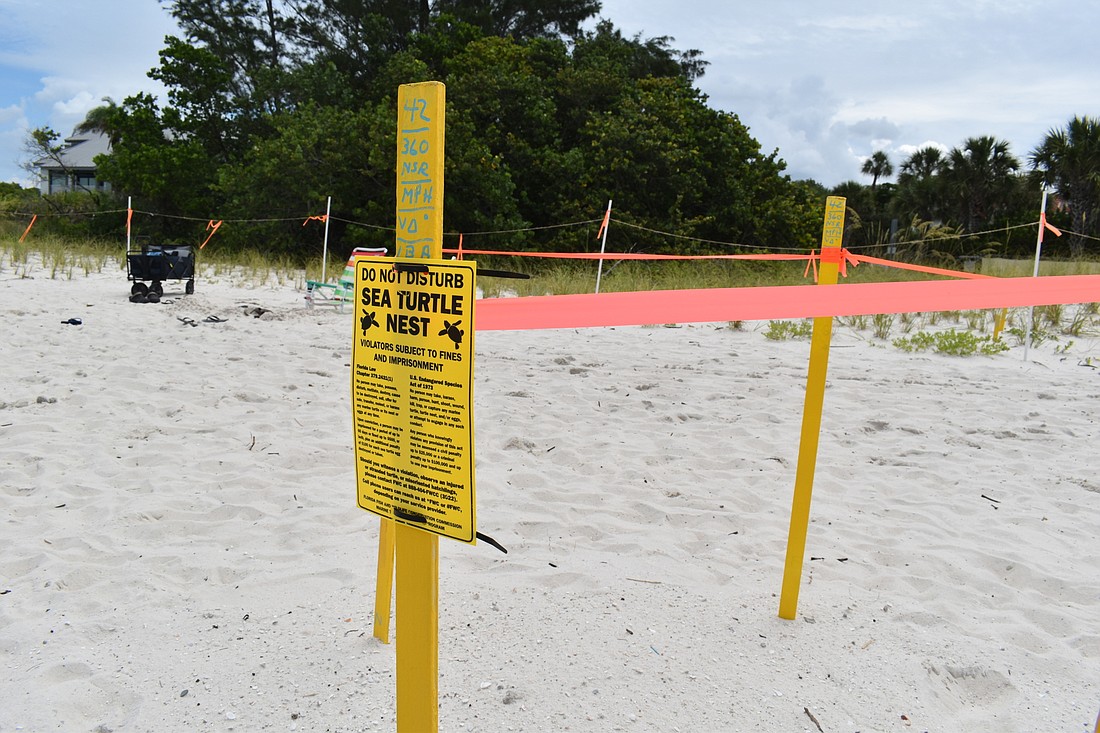- February 17, 2026
-
-
Loading

Loading

People who own, operate and work at Gulf-front resorts have expressed their concerns about proposed marine life protections up for consideration by the Longboat Key Town Commission.
The resorts must balance the needs of their residents and guests while abiding by the protections in place to protect wildlife like sea turtles.
“The majority of the guests totally understand about the safety of turtles and the lighting,” Longboat Key Club managing director Rick Konsavage said. “One of the things that we always are concerned with is the less lighting out towards the beach. We have a lot of boardwalks and access points. We’re worried about people falling or tripping as well.”
The first turtle nest of the 2021 season
Sand Cay Beach Resort general manager Lyn Sorensen also mentioned the importance of the safety of guests once the sun goes down.
“If we didn’t have any illumination, to that point, we’d have people falling,” Sorensen said. “And I have an older population that comes and stays.”
Sorensen said Sand Cay has used turtle-friendly light bulbs and downlights like town leaders have suggested.
The Town Commission’s next regular meeting is June 7, when final consideration could take place. On May 3, commissioners voted 7-0 on the first reading of the ordinance.
The town’s proposals include requiring exterior sources of artificial light visible from the beach to be turtle-friendly bulbs, prohibiting beach furniture to be within 5 feet of marked marine turtle nests, adding language to explain the permitting review process, adding a lighting inspection process for new developments, allowing the use of permitted motorized vehicles to retrieve beach furniture on the beach, prohibiting temporary lights such as lanterns or tiki torches and nightly storage of portable recreational equipment.
Lighting that meets FWC certification standards are typically amber, orange or red and produce light in a wavelength less disruptive to sea turtles than standard white lights. Additionally, the bulbs or lenses must be shielded from beach view.
Last month, town staff considered window tinting as a potential resolution to fix beachfront-lighting issues, though price considerations in switching from 45% of light transmission to 15% proved overwhelming.
However, the town added a note to indicate that if someone applies that 45% window tinting percentage, they may still need to have additional window coverings such as blinds or drapes to comply.
“This addition to that definition is intended to clarify that percentage of window tinting still may require additional window coverings,” Planning, Zoning and Building Director Allen Parsons told commissioners.
If the commission approves the proposed revisions, they wouldn't take effect until May 2022.
“One thing to always consider is the cost of doing this with businesses and residents, it does cost money every time they make changes,” Konsavage said. “We’re more than happy to work within the guidelines.”
Sorensen said she doesn’t believe it’s enough time.
“You have to remember, some of these associations aren’t as lucrative as others,” Sorensen said.
Sand Cay is a 57-unit facility.
Sorensen said Sand Cay considered accepting a $55,226.05 grant in early 2020 from Gainesville-based non-profit Sea Turtle Conservancy to make turtle-friendly upgrades to the property. The resort would have needed to pay $63,000 of its own.
“When we went into COVID shutdown, we could never have afforded $63,000,” Sorensen said.
Konsavage said he's unsure if new supplies can be sourced quickly enough. Many supplies have been on backorder for months, he said.
Florida Fish and Wildlife Conservation Commission data shows Longboat Key has a higher number of disorientations compared to nearby areas. It’s the main reason the Town Commission is considering the revised protections.
Disorientation often happens when artificial lighting disrupts the ability of adult sea turtles or hatchlings to find their way to nesting sites or back to the surf.
Sea turtle nesting season runs each year from May 1-Oct. 31.